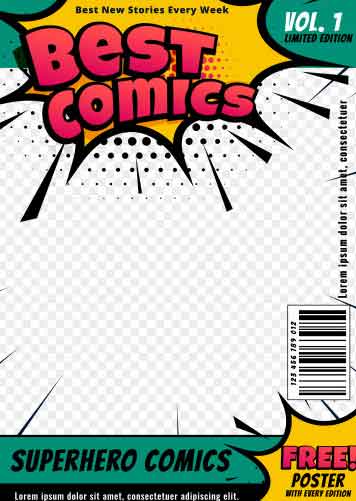Kingdom Come is a landmark story that depicts a bleak future for DC Comic’s characters. Published in 1996, Alex Ross conceived and painted the book with Mark Waid serving as writer. Yes, painted: The realistic characters and luminous hues shows how much of this project was a labor of love. At the same time, Kingdom Come may work better as a vision and visual than as a narrative.
Graphic Novel Synopsis

Kingdom Come takes place in a future where a new crop of heroes takes the place of the old guard. However, the new blood fight crime without any concern for morals or public safety. The early heroes retreat to their fantastical ivory towers, and even Superman isolates himself in a farmland. But when a group of heroes cause a nuclear-level accident, Superman and company return to teach the new generation some values.
Meanwhile, priest Norman McCay experiences visions of an apocalypse caused by superheroes. He is taken by The Spectre, God’s Spirit of Vengeance, to witness the events that lead to this catastrophe, from Superman’s group to an alliance led by Batman to Lex Luthor and his cabal supported by Captain Marvel. Norman serves as the reader’s point of view and as the creators’ voice on the story’s events.
Painting a Vision
Ross is best known for painting realistic versions of superheroes, and Kingdom Come is what happens when Ross goes beyond the cover and paints the entire comic. The characters have supple expressions enhanced by the wrinkles and grays of old age, and each panel carries more weight than a single page of most comic books.
Lighting is also a major factor of the presentation. Contrasts between light and dark become more apparent, from the glow of Norman in the darkness of The Spectre’s realm to Wonder Woman’s golden armor against the fire and death of the climatic battleground. It’s a longer process than conventional drawing, but visually Kingdom Come is unlike any other comic book.
Making Statements
Kingdom Come is a reaction to the grittier heroes and elements that have been the norm for comic books since Watchmen and Batman: The Dark Knight Returns. Dressed in stereotypical armor and leather, the new heroes are power-hungry jerks. By contrast the old guard are redesigned to look authoritative, such as Superman with the yellow in his symbol replaced by a remorseful black or Green Lantern in emerald armor instead of spandex.
The book’s other theme is how the people view superheroes as gods. The novel is strewn with biblical passages, and each chapter opens up with murky images foreshadowing the apocalyptic conclusion. The use of painting instead of line drawings and the POV device of a priest speaking to someone who works for God contribute to the grandeur given to the DC heroes. While the superheroes-as-gods concept can be pretentious for some readers, Kingdom Come revels in it even as it distances itself in the end.

Superhero Seniority
However, while Ross and Waid are adept at creating these themes and the world, Kingdom Come doesn’t provide a solution of how to deal with the new heroes. The young heroes are straw men pushed around by Superman using means as silly as lecturing them at their club to something that’s definitely outside of The Man of Steel’s character. Not even Magog, the reason for Superman’s retreat from public life, proves to be a credible threat, article source.
With no new character strong enough to counter Superman’s team, the story devolves into pre-established characters battling each other. The climatic war is an excuse for Superman and Captain Marvel to fight, and the conclusion is an attempt to shut Pandora’s Box that doesn’t give hope to new heroes in a genre dominated by characters created before the 60s.
Continuity and Impact
While Kingdom Come was not part of DC’s official continuity at first, the book has taken a larger presence in the company and characters like Magog and the book’s darker version of Superman are now regulars in the company’s titles. Kingdom Come might not have the best answers for the questions it asks, but as an exploration of ideas and visual storytelling it remains a distinctive take on DC’s superheroes.
